- Tuesday's with Liz: Sara Luterman
Published on Mar 14, 2016 This week Liz Weintraub, AUCD's advocacy specialist and host of Tuesdays with Liz: Disability Policy for All, interviews Sara Luterman, AUCD program assistant, on how to include people with autism in the workforce. - AUCD Diversity and Inclusion Toolkit
The Developmental Disabilities Assistance and Bill of Rights Act of 2000 (administered by the Administration on Intellectual and Developmental Disabilities or AIDD), the Division of Maternal and Child Health (MCH) Workforce Development Strategic Plan for 2012-2020, and the 2015-2016 Strategic Map for the Association of University Centers on Disabilities (AUCD) all address elements of diversity, equity, inclusion, and cultural competence. This Diversity and Inclusion Toolkit provides concrete objectives, strategies, and resources to help these audiences realize their goals in this area. It also provides a foundation for future efforts, including developing a blueprint for AUCD's network to collectively make progress in diversity, inclusion, and cultural and linguistic competence.
Additional Resources: Equity, Anti-Bias & Anti-Racism
Equity
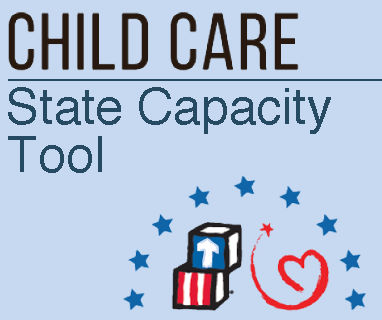
- What is Infant and Early Childhood Mental Health Consultation? Find out what IECMH Consultants do?
- Equity Learn about disparities in the experiences of young children of color and children from other marginalized communities in early childhood settings; discover strategies for IECMHC to impact early childhood professionals’ beliefs, attitudes, and practices to support more effective caregiving for all children, regardless of race, ethnicity, gender, class, or a myriad of demographic characteristics; and better understand policies and procedures, including data collection and analysis procedures, to bridge disparities. The web page includes research, position statements, guidance and applications and tool kits.
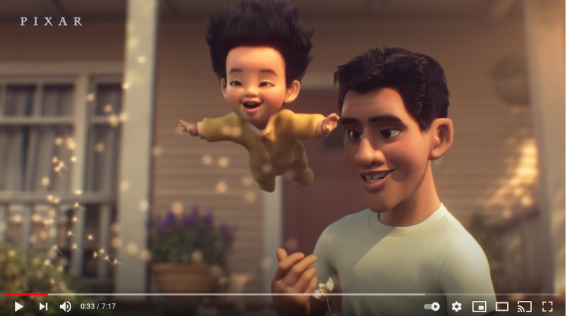
Pixar Animation Studios and the SparkShorts filmmakers of FLOAT are in solidarity with the Asian and Asian American communities against Anti-Asian hate in all its forms. We are proud of the onscreen representation in this short and have decided to make it widely available, in celebration of what stories that feature Asian characters can do to promote inclusion everywhere. Pixar Instagram: https://www.instagram.com/pixar/
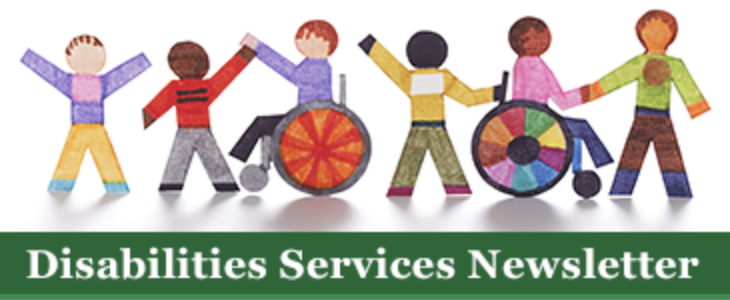
- Early Childhood Equity and Inclusion: Establishing Equitable Early Learning Environments May 2019 Fostering equitable access to learning is important in education as it enhances a sense of belonging and trust for children and their families. The learning environments created by early childhood educators can increase a child's ability to learn and feel comfortable as a member of the group. When children and families see their classroom as a space where they belong, equity is achieved. This newsletter provides a mini training module with a video and tip sheets on creating a caring community and key resources supporting equity and inclusion.
- Supporting Friendships Jan 2019 Friendships between peers are so important. Children learn new skills through social opportunities within natural environments. Education staff can build friendships between children by systematically teaching them ways to interact with each other.
- Preschool to Kindergarten Transitions for Children with Disabilities Oct 2018
- Infant /Toddler to Preschool Transitions for Children with Disabilities Aug 2018
- Supporting Infants and Toddlers with Disabilities or Suspected Delays and Their Families in the Home and in the Classroom July 2018
-
Additional Resources from Disabilities Services Newsletters
- Supporting Children Who Are Dual Language Learners (DLLs) with Disabilities or Suspected Delays June 2018
- Using Assistive Technology to Support Children May 2018
- Creating a Classroom Culture of Acceptance of Individual Differences March 2018
- Classroom Collaborations to Support Inclusion Feb 2018
- Supporting Peer Interactions Dec 2017
- Adapting the Environment to Support Engagement Nov 2017
- Q & A on Free and Appropriate Public Education Following Supreme Court Decision in the Endrew F. v. Douglas County School District Dec 2017
The Q & A provides an overview of the facts and issue in the case, a discussion of the IDEA FAPE requirements and include questions addressing implementation considerations. - Office of Special Education and Rehabilitative Services Blog: US Department of Education Launches Revamped IDEA Website This blog posting describes the new and improved IDEA Website and provides access to the archives of the blog by category
- Q & A and Model State Timeline: Significant Disproportionality (Equity in IDEA) Essential Questions and Answers and a Model State Timeline Published: March 31, 2017
- U.S. Department of Education, Office of Special Education and Rehabilitative Services, Frequently Asked Questions about the Rights of Students with Disabilities in Public Charter Schools under the Individuals with Disabilities Education Act (PDF) Published: December 28, 2016
- Parent Tool Kit Home Published: 2004 Tool kit on teaching and assessing students with disabilities-Parent materials

- Tool Kit for “I thought about quitting today” - The Professional Quality of Life self-assessment tool Fall 2015 This toolkit aids educators in the exploration of the fatigue, burnout and even the trauma they may experience when helping students who are suffering.
- Self-Assessment (to aid in discussions about race and racism) (PDF) Use this graphic organizer to list three vulnerabilities you worry could limit your effectiveness and three strengths you believe will help you to lead open and honest dialogues. Finally, list specific needs that, if met, would improve your ability to facilitate difficult conversations.
- Immigrant Refugee Children: A guide for Educators and School Support Staff This guide was created for educators, school support staff and service providers who teach, mentor and help open the doors of opportunity for undocumented youth and unaccompanied and refugee children currently living in the United States. Educators, school support staff and service providers are often the first individuals a student and/or family comes out to as undocumented.
- Best Practices Best Practices for Serving English Language Learners and Their Families For many educators, helping children learn English is a joy and a privilege. But classroom educators may not always know how their administration is approaching ELL students and vice versa. Reviewing a few key practices as a staff can help move the entire school toward a comprehensive and culturally responsive approach to serving English Language Learners and their families. This guide can help get the process started.
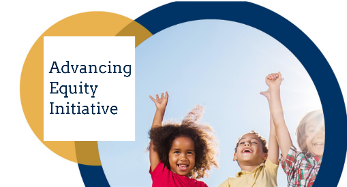


- Every Child Belongs: Welcoming a Child with a Disability May 2019
- 10 Things Every Parent Should Know About Play Oct 2018
- 12 Ways to Support Language Development for Infants and Toddlers
- Top 10 No Cost Toys for Infants Toddlers and Preschoolers
- Ideas for Bringing Humor to the Classroom Humor reflects our joy. And for children and adults alike, it's a wonderful way of reducing stress. Humor helps put things in perspective. Encouraging children to see the humor in life is one of the greatest gifts you can give them. You will be enriching their spirit as well as making learning fun. You and the children can enjoy these activities together.
-
Additional NAEYC Resources
- The Word Gap: The Early Years Make a Difference A recent study shows that children's vocabulary skills are linked to their economic backgrounds. This article explain the study and give 9 recommendations for early care and education providers on how they can close "the word gap".
- Position Statements including the DEC/NAEYC Joint Statement on Early Childhood Inclusion
- The First Step for Addressing Bias is Infant and Toddler Programs, Young Children, November 2017
- Moving Beyond Anti-Bias Activities: Supporting the Development of Anti-Bias Practices
- Cultural Competence Quality Rating and Improvement Systems (QRIS) Implementation
- Engaging Diverse Families Engaging Diverse Families (EDF) is helping early childhood education programs effectively engage diverse families. Our goal is to learn how excellent early childhood education programs are effectively engaging diverse families and to share what we learn with other programs struggling to start and sustain family engagement practices.
- I Dream of the Day Isauro Michael Escamilla, M.A., an Early Childhood Education Teacher Researcher from the San Francisco Unified School District, spoke at the closing session of NAEYC's Institute for Professional Development in San Francisco this year. Here is a particularly moving excerpt.
- The Word Gap: The Early Years Make a Difference A recent study shows that children's vocabulary skills are linked to their economic backgrounds. This article explain the study and give 9 recommendations for early care and education providers on how they can close "the word gap".
- Position Statements including the DEC/NAEYC Joint Statement on Early Childhood Inclusion
- Big Body Play: Why Boisterous, Vigorous, and Very Physical Play Is Essential to Children's Development and Learning A book on encouraging physical activity for children, by Frances M. Carlson.
- Increasing Children's Physical Activity (PDF)
- Our Collection of Children's Songs
- 10 Ways Baby's Learn When We Sing to Them Listening skills, new words, and so much more
- Playing with Music at Home Tips to explore music and connect it to children's learning
- Public Policy Overview NAEYC promotes national, state and local public policies that support a system of well-financed, high quality early childhood education programs in a range of settings, including child care centers, family child care homes, and schools.
- Promoting Social–Emotional Development: Helping Infants Learn About Feelings (PDF) Starting from birth, infants begin learning how to make sense of their world through interactions with caregivers. Responsive caregiving-which involves caregiver reflecting and validating a child’s feelings and behaviors-help very young children makes sense of their world. Over time, children who have this type of nurturing, reflective care better regulates their emotions.
- 10 Tips for Raising a Compassionate Toddler Recent research shows that infants and toddlers are far more empathetic than we once thought. While they have short fuses, and don’t cope well with sharing, they are capable of being compassionate. With this in mind, here are ten tips I use in the classroom to help infants and toddlers become pro-social that families can also try at home.
- NAEYC Radio NAEYC and BAM Radio Network partnered to bring NAEYC Radio. The program was developed to bring the best and latest insights on early childhood education directly to parents and educators.
- 10 tips for Raising a Compassionate Infant Toddler
- Helping Infants Learn About Feelings (PDF)
- Standing Together Against Suspension and Expulsion Joint Policy Statement (PDF)
A group of more than 30 national organizations recently published a joint statement, Standing Together Against Suspension and Expulsion in Early Childhood: A Joint Statement (April 2016), which supports the recommendations from the U.S. Departments of Education and Health and Human services in their December 2014 Joint Policy Statement on Expulsion and Suspension. The organizations have also compiled a number of related resources to help states, districts, communities, and classrooms prevent, limit, and ultimately eliminate suspension and expulsion in early childhood education. - Caring Relationships: The Heart of Early Brain Development By Ron Lally and Peter Mangione
- From Birth to Graduation: Implementing a Seamless System of PBIS Lise Fox of University of South Florida conference session
- Videos: Overview (1) and Demonstration of Pyramid Model Practices in Preschool (2) and Toddler Classrooms (3)
- Preventing Bias, Suspensions and Expulsions in Early Childhood Settings
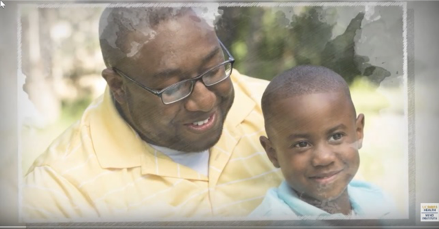
Anti-Bias
- Who Me? Biased? (Video) Length: 2:27 mins This video shows how implicit biases are thought processes that happen without us even knowing it — little mental shortcuts that hold judgments we might not agree with. Sometimes those shortcuts are based on race, ethnicity or gender. These biases can cause educators to engage with students, colleagues and other school community members in destructive ways that are misaligned with their conscious values. Mindfulness can help us act more thoughtfully in the moment and rely less on those automatic shortcuts.
- Mindfulness Mitigates Biases You May Not Know You Have
- Mindfulness Can Literally Change Your Brain
- CARE for Teachers (Video) Length: 3:07 mins Study suggests that mindfulness-based interventions can “increase teacher social and emotional competence and the quality of classroom interactions.”
- Early Childhood Expulsions and Suspensions Undermine Our Nation's Most Promising Agent of Opportunity and Social Justice (2016) Walter S. Gilliam - Presents the latest information regarding early childhood expulsions and suspensions, with a focus on gender and race disparities. Looks at how these disparities violate the civil rights of many young children of color in the U.S. and contribute to the nation's costly achievement gap.
- Unequal Access: Barriers to Early Childhood Education for Boys of Color (2016) Dionne Dobbins, Michelle McCready, Laurie Rackas - Discusses barriers to accessing quality early childhood education for boys of color (high costs; insufficient availability of free or subsidized programs; and implicit biases, which consistently send boys of color negative messages about their behavior, identity, and future) and discusses possible solutions to these issues.

- How to Take SEL to the Next Level at Your School Feb 2019 The article discusses the report, A Nation At Hope, and highlights the value of “ongoing support for the social-emotional learning of teachers,” which is central to teachers’ personal and professional development. It recommends 4 research based activities to promote SEL for teachers.
- Why Teachers Need Social and Emotional Skills By developing social-emotional skills, teachers can rediscover the joy of teaching.
- How Social and Emotional Learning Transforms Classrooms
- Three Ways Mindfulness Can Make You Less Biased
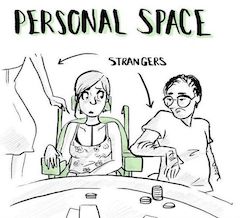

- Every Child Belongs: Welcoming a Child with a Disability May 2019
- 10 Things Every Parent Should Know About Play Oct 2018
- 12 Ways to Support Language Development for Infants and Toddlers
- Top 10 No Cost Toys for Infants Toddlers and Preschoolers
- Ideas for Bringing Humor to the Classroom Humor reflects our joy. And for children and adults alike, it's a wonderful way of reducing stress. Humor helps put things in perspective. Encouraging children to see the humor in life is one of the greatest gifts you can give them. You will be enriching their spirit as well as making learning fun. You and the children can enjoy these activities together.
-
Additional NAEYC Resources
- The Word Gap: The Early Years Make a Difference A recent study shows that children's vocabulary skills are linked to their economic backgrounds. This article explain the study and give 9 recommendations for early care and education providers on how they can close "the word gap".
- Position Statements including the DEC/NAEYC Joint Statement on Early Childhood Inclusion
- The First Step for Addressing Bias is Infant and Toddler Programs, Young Children, November 2017
- Moving Beyond Anti-Bias Activities: Supporting the Development of Anti-Bias Practices
- Cultural Competence Quality Rating and Improvement Systems (QRIS) Implementation
- Engaging Diverse Families Engaging Diverse Families (EDF) is helping early childhood education programs effectively engage diverse families. Our goal is to learn how excellent early childhood education programs are effectively engaging diverse families and to share what we learn with other programs struggling to start and sustain family engagement practices.
- I Dream of the Day Isauro Michael Escamilla, M.A., an Early Childhood Education Teacher Researcher from the San Francisco Unified School District, spoke at the closing session of NAEYC's Institute for Professional Development in San Francisco this year. Here is a particularly moving excerpt.
- The Word Gap: The Early Years Make a Difference A recent study shows that children's vocabulary skills are linked to their economic backgrounds. This article explain the study and give 9 recommendations for early care and education providers on how they can close "the word gap".
- Position Statements including the DEC/NAEYC Joint Statement on Early Childhood Inclusion
- Big Body Play: Why Boisterous, Vigorous, and Very Physical Play Is Essential to Children's Development and Learning A book on encouraging physical activity for children, by Frances M. Carlson.
- Increasing Children's Physical Activity (PDF)
- Our Collection of Children's Songs
- 10 Ways Baby's Learn When We Sing to Them Listening skills, new words, and so much more
- Playing with Music at Home Tips to explore music and connect it to children's learning
- Public Policy Overview NAEYC promotes national, state and local public policies that support a system of well-financed, high quality early childhood education programs in a range of settings, including child care centers, family child care homes, and schools.
- Promoting Social–Emotional Development: Helping Infants Learn About Feelings (PDF) Starting from birth, infants begin learning how to make sense of their world through interactions with caregivers. Responsive caregiving-which involves caregiver reflecting and validating a child’s feelings and behaviors-help very young children makes sense of their world. Over time, children who have this type of nurturing, reflective care better regulates their emotions.
- 10 Tips for Raising a Compassionate Toddler Recent research shows that infants and toddlers are far more empathetic than we once thought. While they have short fuses, and don’t cope well with sharing, they are capable of being compassionate. With this in mind, here are ten tips I use in the classroom to help infants and toddlers become pro-social that families can also try at home.
- NAEYC Radio NAEYC and BAM Radio Network partnered to bring NAEYC Radio. The program was developed to bring the best and latest insights on early childhood education directly to parents and educators.
- 10 tips for Raising a Compassionate Infant Toddler
- Helping Infants Learn About Feelings (PDF)
- Standing Together Against Suspension and Expulsion Joint Policy Statement (PDF)
A group of more than 30 national organizations recently published a joint statement, Standing Together Against Suspension and Expulsion in Early Childhood: A Joint Statement (April 2016), which supports the recommendations from the U.S. Departments of Education and Health and Human services in their December 2014 Joint Policy Statement on Expulsion and Suspension. The organizations have also compiled a number of related resources to help states, districts, communities, and classrooms prevent, limit, and ultimately eliminate suspension and expulsion in early childhood education. - Caring Relationships: The Heart of Early Brain Development By Ron Lally and Peter Mangione
- From Birth to Graduation: Implementing a Seamless System of PBIS Lise Fox of University of South Florida conference session
- Videos: Overview (1) and Demonstration of Pyramid Model Practices in Preschool (2) and Toddler Classrooms (3)
- Preventing Bias, Suspensions and Expulsions in Early Childhood Settings
- Early Childhood Expulsions and Suspensions Undermine Our Nation’s Most Promising Agent of Opportunity and Social Justice- September 2016 Issue Brief by Walter Gilliam, PhD
Presents the latest information regarding early childhood expulsions and suspensions, with a focus on gender and race disparities. Looks at how these disparities violate the civil rights of many young children of color in the U.S. and contribute to the nation's costly achievement gap. - Unequal Access: Barriers to Early Childhood Education for Boys of Color –August 2016 Issue Brief by Child Care Aware
Discusses barriers to accessing quality early childhood education for boys of color (high costs; insufficient availability of free or subsidized programs; and implicit biases, which consistently send boys of color negative messages about their behavior, identity, and future) and discusses possible solutions to these issues.
Anti-Racism
- Who Me? Biased? (Video) Length: 2:27 mins This video shows how implicit biases are thought processes that happen without us even knowing it — little mental shortcuts that hold judgments we might not agree with. Sometimes those shortcuts are based on race, ethnicity or gender. These biases can cause educators to engage with students, colleagues and other school community members in destructive ways that are misaligned with their conscious values. Mindfulness can help us act more thoughtfully in the moment and rely less on those automatic shortcuts.
- Mindfulness Mitigates Biases You May Not Know You Have
- Mindfulness Can Literally Change Your Brain
- CARE for Teachers (Video) Length: 3:07 mins Study suggests that mindfulness-based interventions can “increase teacher social and emotional competence and the quality of classroom interactions.”
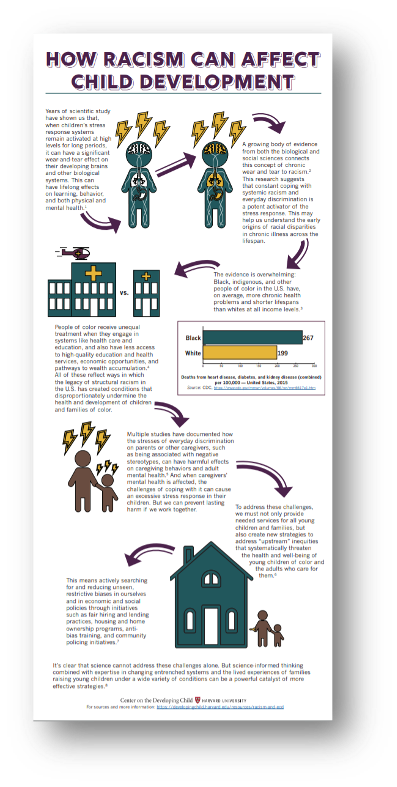
It’s time to connect these dots. This infographic explains in basic terms how racism, in particular, gets “under the skin” and affects learning, behavior, and lifelong health. There is much more to say, but by starting with a shared understanding, we can work together toward creative strategies to address these long-standing inequities. More information and resources are available in this article:
More information and resources are available in the article Connecting the Brain to the Rest of the Body: Early Childhood Development and Lifelong Health are Deeply Entwined.

- Tool Kit for “I thought about quitting today” - The Professional Quality of Life self-assessment tool Fall 2015 This toolkit aids educators in the exploration of the fatigue, burnout and even the trauma they may experience when helping students who are suffering.
- Self-Assessment (to aid in discussions about race and racism) (PDF) Use this graphic organizer to list three vulnerabilities you worry could limit your effectiveness and three strengths you believe will help you to lead open and honest dialogues. Finally, list specific needs that, if met, would improve your ability to facilitate difficult conversations.
- Immigrant Refugee Children: A guide for Educators and School Support Staff This guide was created for educators, school support staff and service providers who teach, mentor and help open the doors of opportunity for undocumented youth and unaccompanied and refugee children currently living in the United States. Educators, school support staff and service providers are often the first individuals a student and/or family comes out to as undocumented.
- Best Practices Best Practices for Serving English Language Learners and Their Families For many educators, helping children learn English is a joy and a privilege. But classroom educators may not always know how their administration is approaching ELL students and vice versa. Reviewing a few key practices as a staff can help move the entire school toward a comprehensive and culturally responsive approach to serving English Language Learners and their families. This guide can help get the process started.
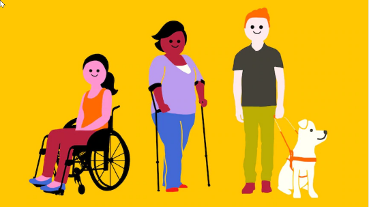
Ableism is the favoring of able neurotypical people, and the exclusion and devaluation of people who are disabled and neurodivergent.
Ableism may not be intentional (in the same way that racism or sexism may not be intentional) but that doesn't mean it's not harmful.
Take the many media stories that often use words that communicate the underlying message we are a "burden" on society.
The following are existing resources posted throughout the MAP website that contain further information relating to Equity, Anti-Bias or Anti-Racism